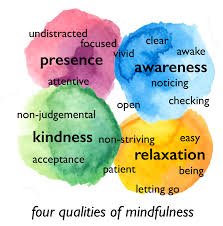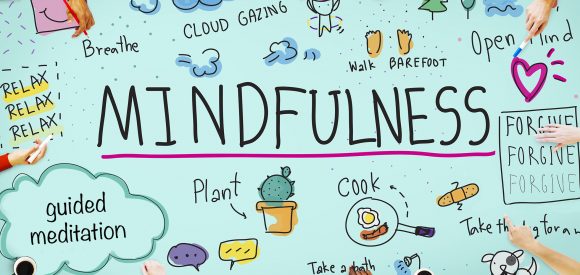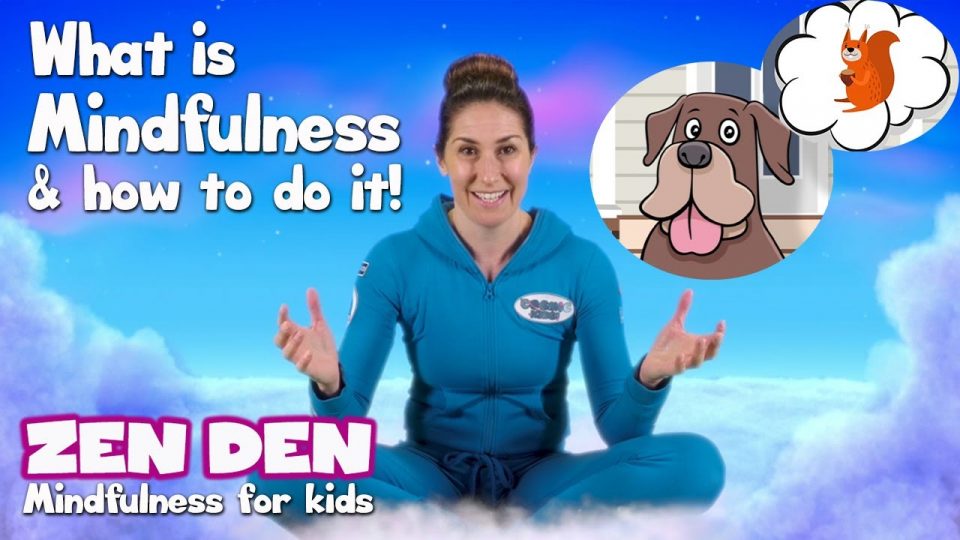A big reason people sign up to be in improv class is to learn to be more present and in the moment. They want to be able to enjoy life more and engage in what’s happening in their lives. They want to get out of their heads (where they are often thinking about the future or the past, which is where most suffering occurs) and into the present. Lately, I’ve been thinking about improv can be seen as a mindfulness practice.
Mindfulness, although an ancient concept, has become seemingly ubiquitous in the last decade. And there are so many mindfulness practices: yoga, meditation, journaling, mindful eating, mindful coloring, etc.
My kids’ schooling is full of mindfulness techniques: balloon breathing, pretzel stretching, countdowns, cozy corners, shaking up jars of glitter water, and sensory gardens. My kid has more calming tools at 8 than I did at 28. I’m very curious what kinds of grown-ups all this mindfulness for kids will create.
I think the intention is to give kids the tools we wished we had had when we damaged our relationships, career or goals by not being able to control our thoughts or emotions. And I while I find mindfulness practices a welcome and refreshing part of my life, they were something I found when I needed them. Not something hammered on me on a daily basis before I even really knew I wanted it. Will these kids become super-evolved and skip a lot of the previous generation’s missteps? Will mindfulness become performative instead of authentic? Will they rebel against mindfulness and embrace a more externalized system? There’s gotta be a catch or a dark side, right? The hope is that they will have Jedi-level mind control, which they’ll need in this screen-based world that does everything it can to get you out of the moment and out of your body.

Of course, improv is one of my favorite mindfulness practices. I find it more fun and faster than the alternatives (although I’m biased, of course). But it’s not the only mindfulness activity I do. It was actually when I was on my yoga mat in my bedroom, following along to 30 Days of Yoga with Adriene (which I have personally renamed 30 Days of Yoga in 90 Days) that I had a thought, “Maybe there is something that distinguishes improv from all those other mindfulness tools and practices.” Improv is working on interpersonal presence, a word I think I kinda just made up, but I Googled and it also seems to exist elsewhere. Interpersonal presence would be being present in the moment with yourself and others.
This involves both being aware of yourself and aware of another person. And being in an authentic connection with that person. What are the other activities that strengthen interpersonal presence? My first thoughts are: making music together in a chorus, band or orchestra. This nails the interpersonal part but not always the presence bit. Authentic relating (which I’ve never tried and have a feeling I would either love or hate–you tell me.). Nonviolent communication might be the best fit, in that it has you examining your thoughts and feelings and redirecting them in conversation. What else?
I think as an extrovert, these interpersonal mindfulness practices feel more accessible to me. I’ve never been able to consistently journal and I’m in awe of those who do. I often say if I had an extra hour in the day, I would do yoga with it, but I rarely get that hour. Guided meditation is something I’ve only been desperate enough to attempt when I’m battling insomnia.
At the same time, as an extrovert, the practices which have me tuning in to my inner voice are the most challenging and rewarding. And helps me show up more fully as myself when I am with others. What are your most rewarding mindfulness practices? Or has mindfulness itself lost some of its meaning in all the commoditization and ever-presence?


